Kansas’ Unrivaled Rural Hospital Crisis: 58% at Risk of Closing, 82% Lost Money on Patient Care Legislators, governor fighting life-and-death struggle over Medicaid expansion
Published December 12th, 2023 at 10:01 AM
Above image credit: Gov. Laura Kelly, left, listens to a discussion about the advantage of expanding eligibility for Medicaid to lower-income Kansans as 40 states have done since 2014, including Missouri, Nebraska, Colorado and Oklahoma. (Tim Carpenter | Kansas Reflector)TOPEKA, Kansas — Financial weaknesses at four of every five rural Kansas hospitals provide leverage to Medicaid expansion advocates who are eager for the infusion of $680 million annually in new government investment into the state’s health care system.
The Center for Healthcare Quality and Payment Reform says 84 of the state’s 102 rural hospitals recorded financial losses on patient services in the most recent year data is available. The health policy organization reports 59 of the state’s rural hospitals are in jeopardy of closing. Twenty-eight are at immediate risk of collapse.
A health care delivery calamity has been building for years, as 10 of Kansas’ rural hospitals closed since 2005. The most recent to fold was Herington Hospital. It was shuttered in October after 104 years of operation because of low patient volume and chronic financial challenges.
“How much more evidence do we need that rural communities need our support to keep health care affordable and accessible?” said Democratic Gov. Laura Kelly.
Kelly said expansion of Medicaid eligibility to about 150,000 lower-income Kansans will narrow coverage gaps and throw a lifeline to hospitals and communities. The option has been available since 2014 to states under provisions of the Affordable Care Act. So far, 40 states have expanded Medicaid access. The law says the federal government covers 90% of new health costs.
Study after study shows health outcomes for rural residents in states that did not expand Medicaid were worse than outcomes for their counterparts in states that did.
Kelly said Kansas lawmakers need to carefully examine the Medicaid expansion experiences of Colorado, Nebraska, Missouri and Oklahoma. Those expansion states have a lower percentage of rural hospitals at risk of closing than Kansas. They range from a low of 3% in Nebraska to 21% in Colorado, 33% in Missouri and 47% in Oklahoma.
“We can only judge the impact of not expanding Medicaid by looking at the states around us that have,” Kelly said.
The Center for Healthcare Quality didn’t disclose which of 59 rural Kansas hospitals were on the ropes. Supporters and opponents of Medicaid expansion also declined to identify the state’s most financially distressed hospitals.
U.S. Sen. Jerry Moran, a Kansas Republican, considered the situation dire enough to introduce last week the Rural Emergency Hospital Adjustment Act. He wants to significantly expand a federal program created three years ago to strengthen financially compromised rural hospitals. The current law allows hospitals to secure a new Medicare provider designation and associated federal aid if they met program requirements the day the law was signed, Dec. 27, 2020.
Moran proposes Congress retroactively extend eligibility to Jan. 1, 2015. Financial incentives can be relied on to reopen closed critical access hospitals or rural hospitals with no more than 50 beds, the senator said.
“Access to outpatient and emergency services often determines if a rural community can survive,” Moran said. “More than 100 (U.S.) rural hospitals have closed since 2015, and this legislation will allow these hospitals an opportunity to reopen and serve their communities.”
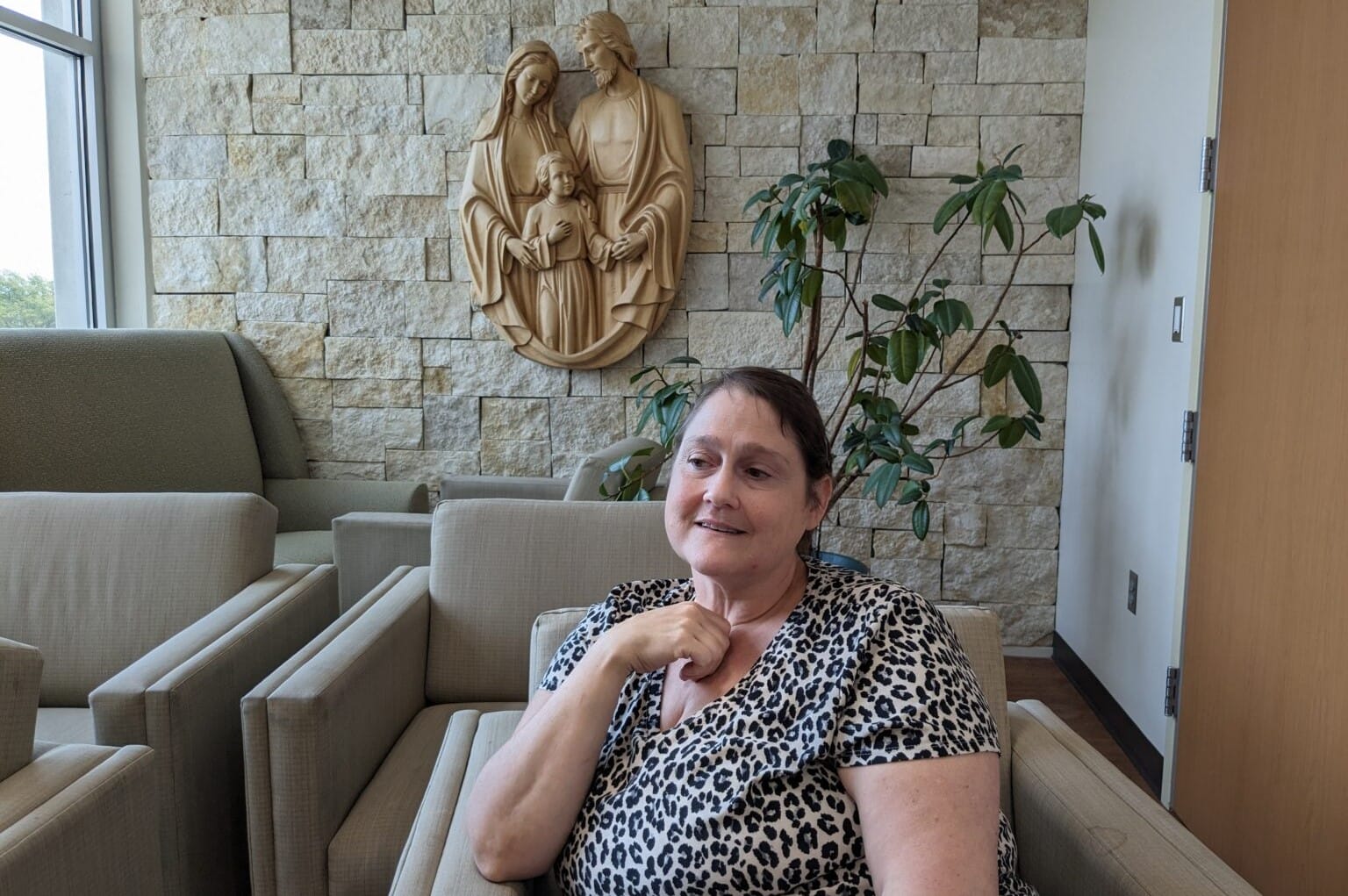
Daily Anxiety
Kelly, who is married to a pulmonary specialist, said Kansans deserve access to affordable, quality health care via Medicaid. The governor said making more adults and children eligible will support Kansas counties challenged to serve a significant cadre of impoverished patients, experiencing declining population and struggling to sustain quality-of-life services.
“We know in our rural communities what helps them thrive: schools and hospitals,” Kelly said. “Medicaid expansion is not the be-all and end-all to the issues facing our rural hospitals or rural communities, but it is a tool, and we know without it … we will continue to be facing greater closures than states that have expanded it.”
In Pittsburg, Kelly said during a visit to Ascension Via Christi Hospital that opponents of Medicaid expansion are affixing targets to the backs of needy Kansans. She could have been talking about home health aide Shawna Jacobs, who was in the audience. She endures day-to-day anxiety of living without health insurance.
Jacobs’ reality mirrors that of Kansas caregivers who are essential to helping disabled and elderly residents remain in their homes, but who are compensated with an average wage of $14 an hour. It can be too much for a person to qualify for health coverage under the state’s austere Medicaid program and not enough to buy private health insurance, Jacobs said.
“I’ve been in the field for 32 years, and I haven’t had insurance for the last six years,” she said. “It’s extremely stressful.”
Jacobs, who resides in the small southeast Kansas community of Frontenac, is among an estimated 109,000 Kansas adults who can benefit from expanding eligibility in the Medicaid system. It is assumed 39,000 children also would be covered thanks to state expansion.
Jacobs said her quality of life is compromised because she doesn’t hold a keycard to unlock health services available to more fortunate Kansans, including state politicians making decisions about her health coverage.
That means she pays nearly $400 out of pocket each month for medications and other care. She put off going to a dentist to address an infected tooth because she didn’t have the $800 upfront payment. By the time she had the cash, her dental health declined to an extent that five teeth were extracted. Her vision diminished beyond the capabilities of inexpensive reader glasses, but she last saw an optometrist two years ago.
Jacobs talked about her frustration while sitting in the lobby of Ascension Via Christi in Pittsburg, one of dozens of Kansas hospitals and clinics that would benefit from infusion of $682.4 million annually — if lawmakers expanded Medicaid.
Since 2014, states led by Republicans and Democrats have taken advantage of Medicaid expansion to improve health care delivery. Kansas has shrugged off approximately $7 billion by rebuffing Medicaid options woven in the ACA signed by President Barack Obama. Republican Gov. Sam Brownback vetoed a Kansas expansion bill in 2017. The GOP-led Legislature has derailed every subsequent expansion plan.
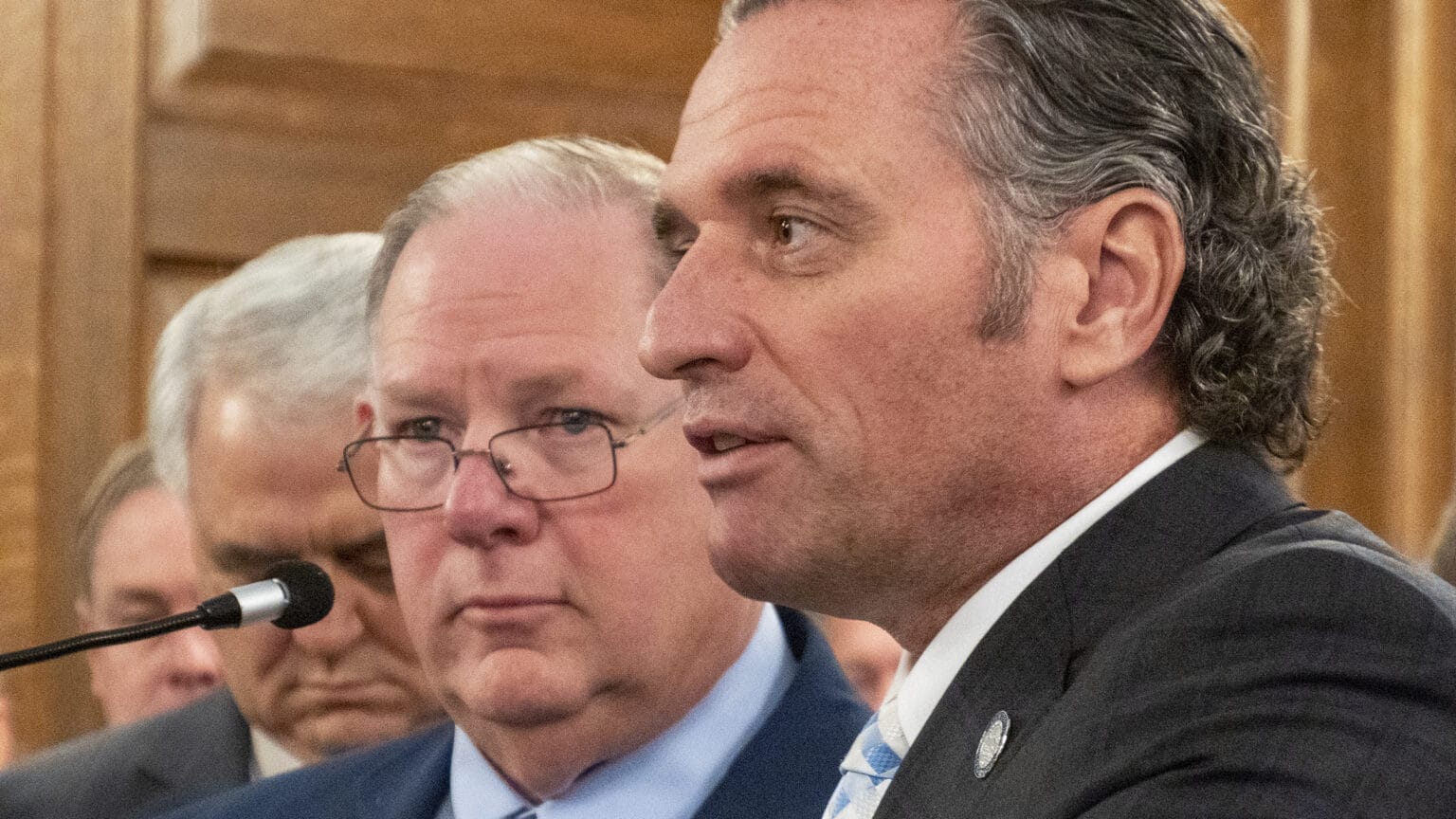
Expansion Popular
Since the governor launched a grassroots campaign in September to build legislative support for expansion, Herington Hospital was shuttered and Ascension Via Christi closed an emergency department in Fort Scott. The Center for Healthcare Quality and Payment Reform says only three states — Texas, Tennessee and North Carolina — have closed more rural hospitals than Kansas since 2005.
Reasons for the exodus range from inflation in operating costs, declining patient bases, federal regulatory challenges, and uncompensated care of the uninsured, as well as stagnant reimbursement rates paid by private and government insurers. Proponents of Medicaid expansion say it is undeniable that pumping hundreds of millions of dollars each year into the state’s health system will moderate those influences to the benefit of hospitals and their patients.
Debate about hospitals and Medicaid in the Capitol’s political bubble has percolated far beyond Topeka. Health, business, education and religious organizations across the state are raising comparable questions: Do the working poor of Kansas deserve preventative and emergency care? What about the economics of fairly compensating hospitals and clinics? Does quality of life in rural Kansas factor into the equation? Should politicians face up to moral and religious obligations to care for the sick? Should ideological opposition to entitlement programs trump the needs of tens of thousands of Kansans?
Polling by Fort Hays State University shows seven of 10 Kansans want the Legislature to follow in the footsteps of Missouri, Oklahoma, Colorado, Nebraska and three dozen other states by expanding Medicaid coverage. In the FHSU survey released in October, only 9% opposed expansion. Substantial support for deepening Medicaid is evident in the polling among Kansas Republicans, independents and Democrats.
“Prior to becoming a state representative, I was a physician providing care for the homeless, the working poor and others in need,” said Rep. Ron Bryce, a conservative Republican from Coffeyville. “I know the workings of Medicaid firsthand from the point of view of the provider as well as the patient. We need to weigh the pluses as well as the minuses.”
Senate President Ty Masterson and House Speaker Dan Hawkins, both right-wing Republicans, said Kansas lawmakers shouldn’t deliver government health insurance to “able-bodied adults” while disabled residents of the state remain on waiting lists for Medicaid services.
That referred to more than 7,000 physically or intellectually disabled Kansans enrolled in Medicaid, but waiting for the Legislature to provide funding for home- and community-based services such as employment training and tuition for day programs.
The Alliance for a Healthy Kansas, a Medicaid expansion advocacy group, said in response to arguments made by Hawkins and Masterson that Medicaid expansion will allow 15,000 Kansans with disabilities to enroll in Medicaid and won’t force people with disabilities onto waiting lists for services. The alliance also said expansion will enable personal attendants who care for people with disabilities to receive health coverage under Medicaid and serve to alleviate a critical shortage of these workers in Kansas.
Masterson and Hawkins, whose leadership positions make them the most influential members of the Senate and House, have well-formed agendas that include avoiding Medicaid expansion debate that might deliver policy victories for Kelly, moderate Republicans and Democrats anxious about the health of Kansas hospitals.
“The governor has sadly chosen to make empty promises that offer false hope for our rural communities to fit her Medicaid expansion narrative,” Masterson said.
Hawkins said struggling hospitals in Kansas have an obligation to restructure services to meet financial challenges rather than insist on government bailouts. He said “big government is not and will never be the answer to increasing health care access to Kansans.”
About 500,000 children, pregnant women, seniors and people with disabilities in Kansas are enrolled in Medicaid. But 225,000 Kansans between the ages of 19 and 65 have no health insurance, according to a Kansas Health Institute report, and 75.5% of them are working.
Kelly promised to submit to the Legislature her sixth proposal for expanding Medicaid and vowed to make it her top priority of the 2024 session.
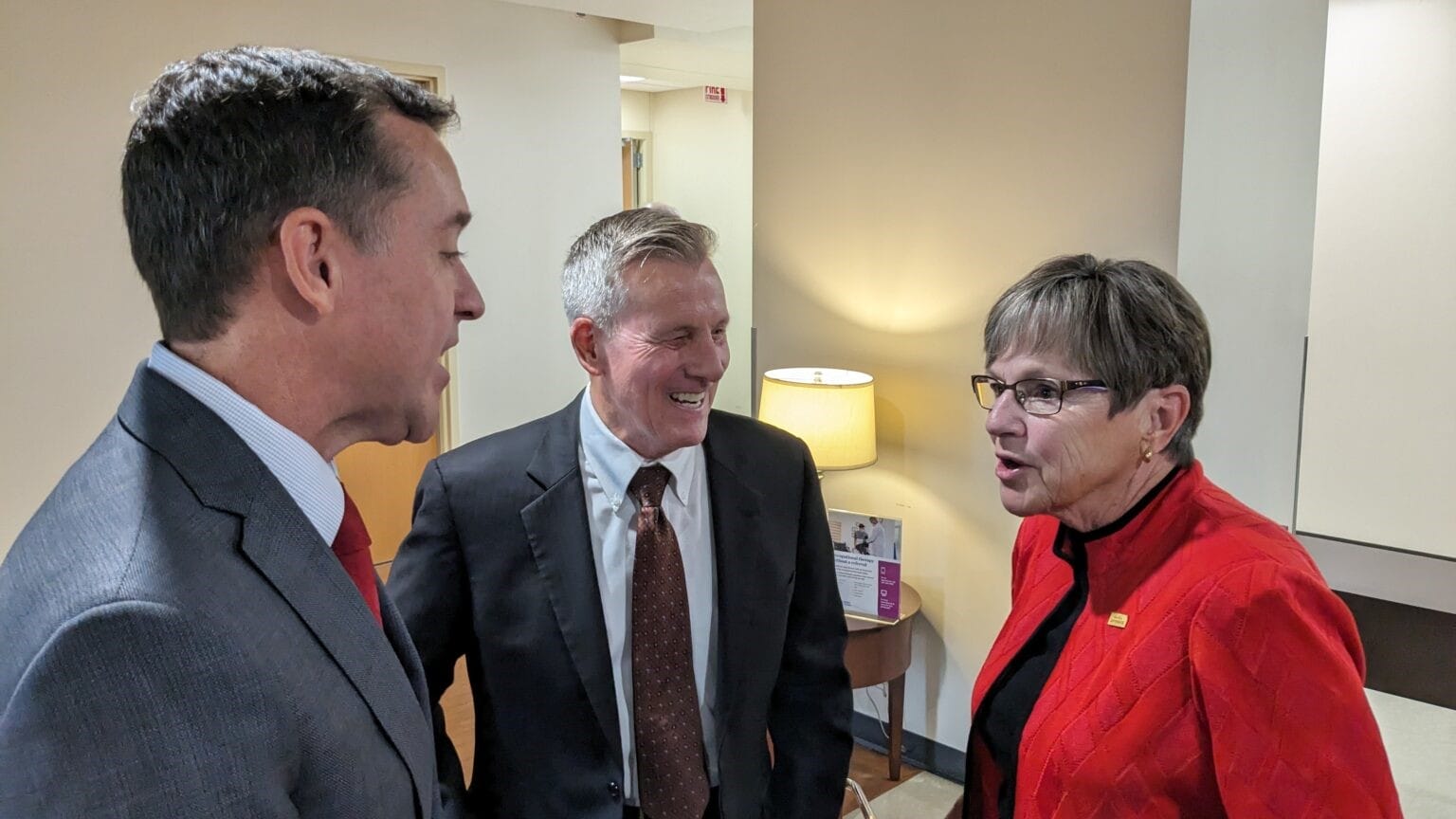
‘Pretty Bleak’ Trajectory
Administrators at hospitals in Kansas are urging lawmakers to break from the 10 Southern and rural states that — so far — reject Medicaid expansion.
“We have a lot of facilities that are currently at risk of closing,” said Brian Barta, CEO at William Newton Hospital in Winfield. “We’ve seen a number of them close over the last five, six years. We expect there to be more. We think that there are plenty of opportunities for us to find solutions to it, but what that takes is everyone coming together.”
Champions of expansion argue benefits go beyond bolstering hospital balance sheets. They say change will create an estimated 23,000 jobs, improve availability of mental health counseling and benefit law enforcement by reducing arrests and confinement costs.
Dennis Franks, CEO of Neosho Memorial Regional Medical Center in Chanute, said federal funding for expansion state employers in Oklahoma and Missouri is leading to the loss of hundreds of Kansas nurses because they can earn better salaries over the state line. He sent a series of letters to Kansas legislators urging them to consider expansion. He asks they view the issue in terms of Kansas’ workforce shortage in life-and-death occupations.
“If we’re not taking care of our staff, then we’re not taking care of our hospital,” Franks said. “Medicaid expansion is going to help my hospital add jobs, fund equipment and add new services.”
Medicaid expansion will relieve financial pressure on mental health clinics, said Susan Rome, deputy director of the Johnson County Mental Health Center. The center spent $6 million on charitable care in 2022, and a big chunk went to 60% of the center’s clients not currently eligible for Medicaid.
“Failure to expand Medicaid has sidelined too many of our neighbors in Johnson County, keeping them from getting help for mental illnesses or substance use disorders,” Rome said.
Donna Ginther, distinguished professor of economics and director of the Institute for Policy and Social Research at the University of Kansas, said research indicates Kansas pays a hefty price for declining to expand Medicaid.
Kansas experienced higher growth of health insurance premiums from 2014 to 2018 compared with states that extended eligibility for Medicaid, Ginther said.
She said Kansas Department of Revenue data show Kansas counties that subsidize local public hospitals have increased property tax mill levies by one-third since states were given the opportunity to expand Medicaid in 2014. Hospital mill levies in Barber, Crawford, Haskell, Sumner and Washington counties more than doubled from 2014 to 2021, she said.
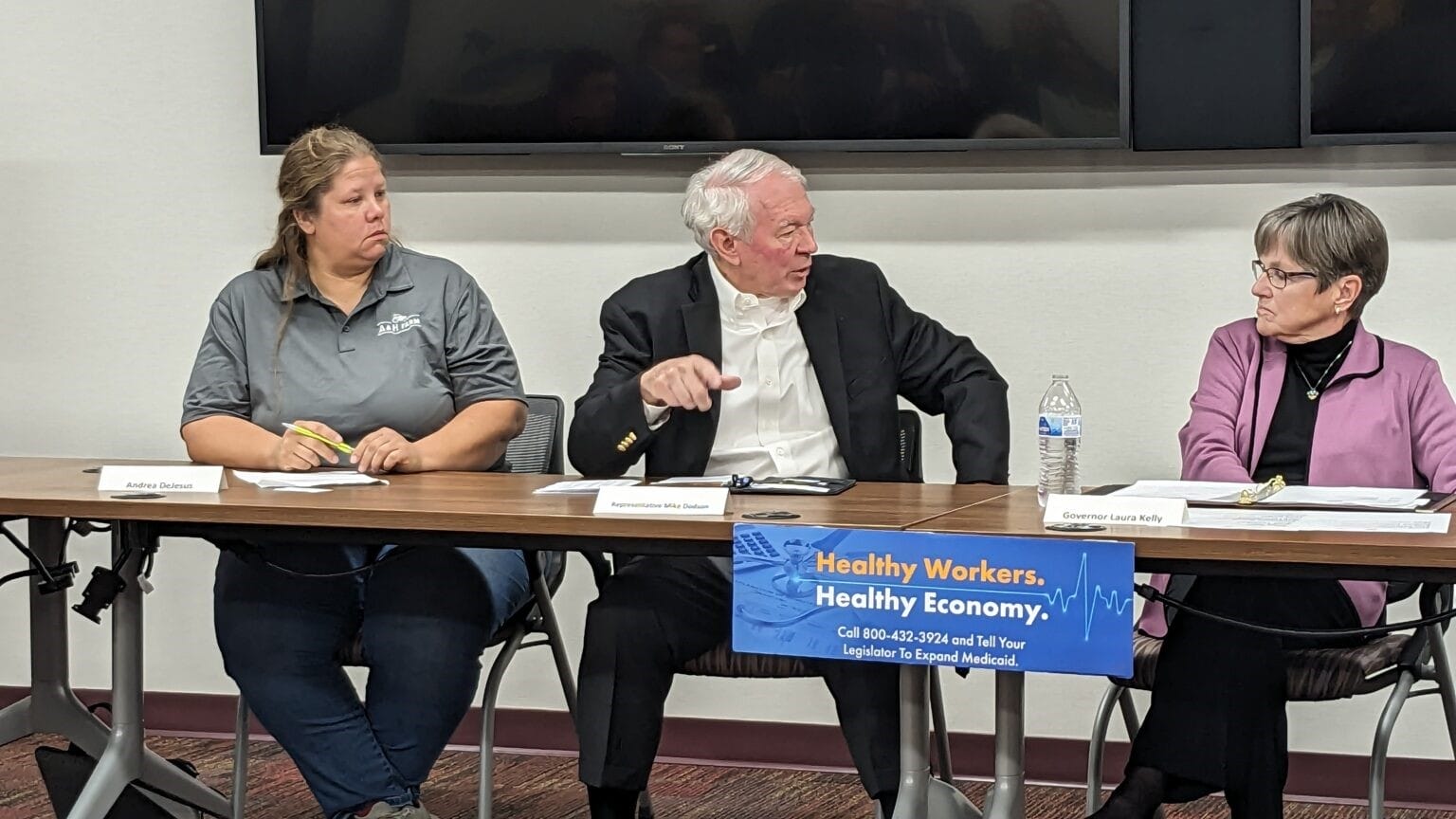
On the Road
Rep. Michael Dodson, a Manhattan Republican and retired three-star general in the U.S. Army, said he was irritated the Legislature’s committee process doesn’t allow exploration of Medicaid expansion. Dodson, along with dozens of other legislators, has never voted on a Medicaid expansion bill vetted by House and Senate members because leadership deny them opportunity to do so.
“It’s been very frustrating for some of us that we can’t get things heard at the Statehouse. We need to do that,” Dodson said.
Sen. Carolyn McGinn, R-Sedgwick, voted for the 2017 Medicaid expansion legislation vetoed by Brownback. She said it is troubling that federal tax dollars have been directed for nearly a decade “to other states to help their workers and health care” to the exclusion of Kansas.
Kelly and Lt. Gov. David Toland sponsored a series of panel discussions on Medicaid in Garden City, Pittsburg, Topeka, Wichita, Salina, Overland Park, Parsons and Emporia. In Manhattan, the governor put the Medicaid expansion question directly to GOP Rep. Kenny Titus, an attorney serving a district covering parts of Riley, Wabaunsee and Pottawatomie counties.
Titus said his answer would depend on what is contained in a Medicaid bill, particularly why change is sought.
He said Medicaid won’t save financially strapped hospitals in Kansas because reimbursement rates to providers are unlikely to fully cover the cost of services. Hospitals in dire straits ought to focus on partnerships with other providers to right-size health care operations, he said.
“I don’t think anybody in here, paying attention, would deny that access to care in whatever form that comes in is vital for vibrant, thriving rural communities, agriculture workforces, schools — all of that ties together,” Titus said.
U.S. Rep. Sharice Davids, a Democrat serving the 3rd District’s urban Wyandotte and Johnson counties, as well as rural Anderson, Franklin and Miami counties, said the Legislature is unfairly denying her constituents access to affordable preventative and emergency health care. Expansion of Medicaid can improve the “well-being of all Kansans regardless of where they reside in our state,” she said.
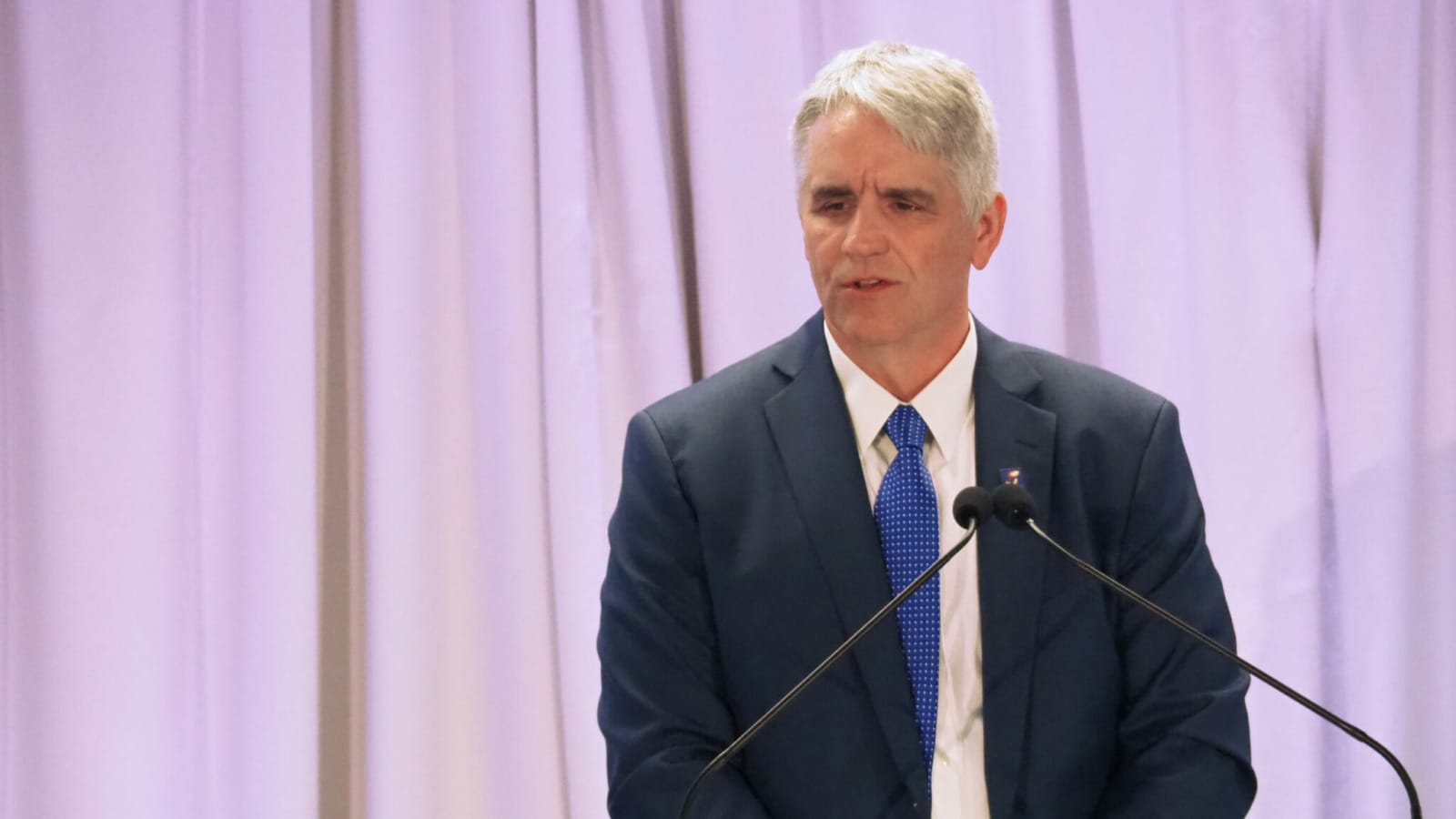
Lower Mortality Rate
Sister Janice Thome, with the Dominican Sisters Ministry of Presence in Dodge City, has dedicated her life to welfare of people with low incomes. Many people who would be eligible for an expanded Medicaid program hold jobs, she said, but don’t earn an income robust enough to cover hospital and clinic bills.
“An example is the lady who makes 50 cents too much per hour to qualify for Medicaid for her child,” Thome said. “Persons who find out they are pregnant or in need of surgery have told me they are moving out of state because they are in the gap and won’t be able to finance this new situation. The working poor deserve health care, and we here in rural Kansas will always need more workers.”
U.S. rural and urban hospitals similarly suffer workforce shortages, financial shortfalls, stagnant reimbursement, inflation, rising supply costs, demographic changes and regulatory hurdles, said Chad Austin, president and CEO of the Kansas Hospital Association.
Austin said Kansas and other states that reject Medicaid expansion have no choice but to absorb financial consequences of higher numbers of uninsured patients and uncompensated care that erode the bottom line.
“When you’re trying to attract physicians, nurses and other health care providers, … we’re not going to be able to meet the same requests and demands to attract that workforce to the state,” Austin said.
Lives will be saved through broader application of preventative health care through Medicaid, said Roy Jensen, director of the University of Kansas Cancer Center in Kansas City, Kansas.
He said low-income individuals in states that expand Medicaid have a 6.1% lower mortality rate. The reduction was reported in the American Journal of Health Economics based on analysis of Medicaid expansions in New York, Arizona and Maine.
“If you are unlucky enough to be without insurance of any type on that day that you are diagnosed with cancer, five years from that date there is a 50% decreased likelihood that you will be alive,” he said.
Tim Carpenter covers the Capitol for the Kansas Reflector, a nonprofit news operation covering Kansas state government and politics as part of States Newsroom. This story first appeared on the Reflector.


